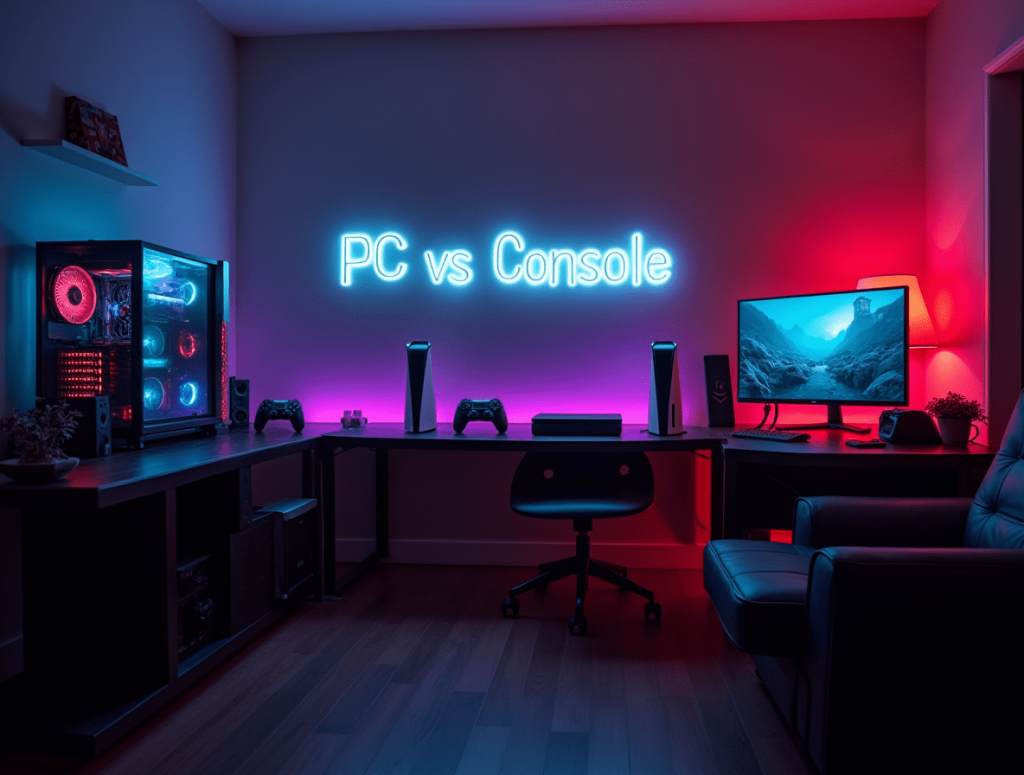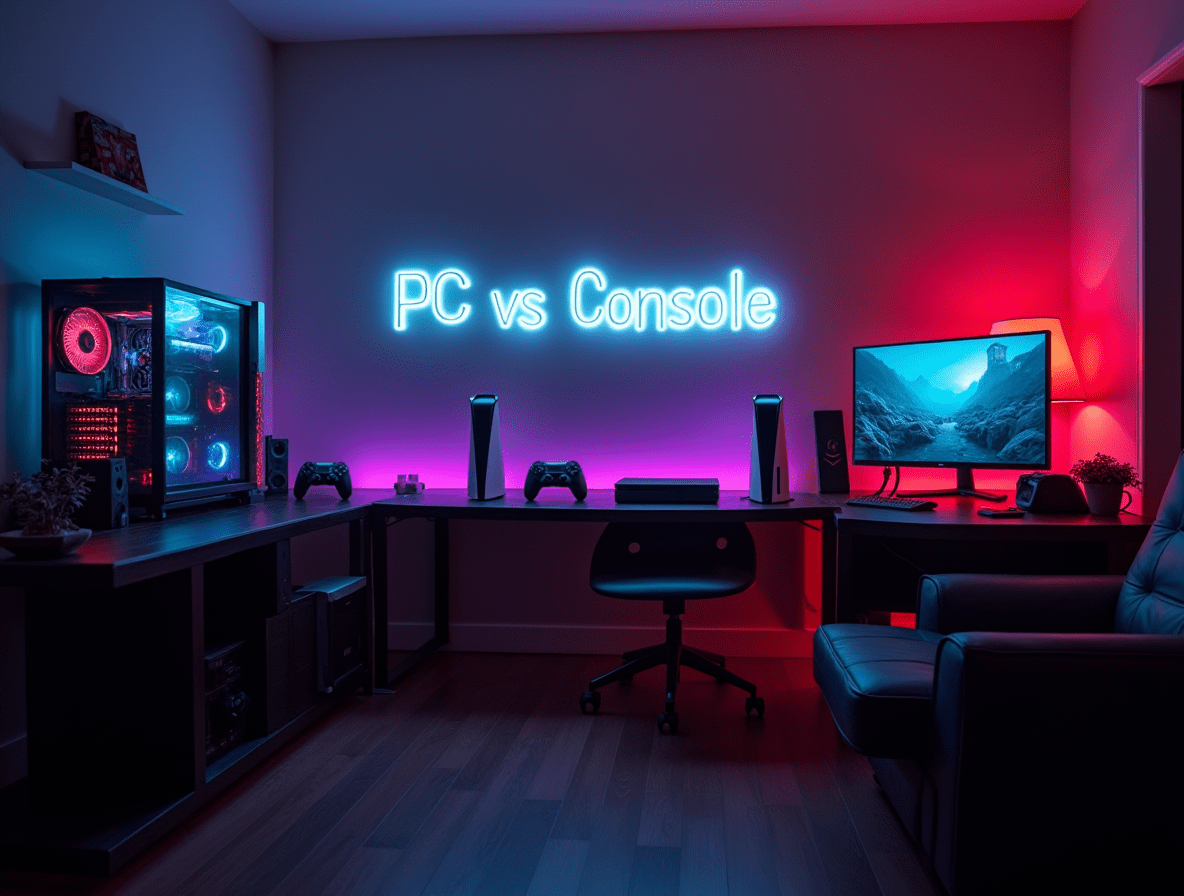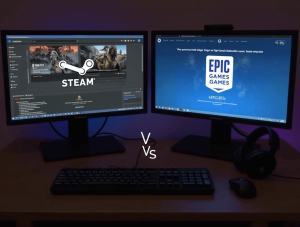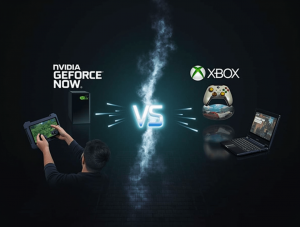
Which Platform Delivers the Ultimate Experience?
The average gamer now spends over 8 hours per week playing video games, making the choice between PC and console gaming more important than ever. Whether you’re considering your first gaming system or thinking about switching platforms, the decision impacts everything from your gameplay experience to your wallet.
Many gamers find themselves torn between the customizable power of a gaming PC and the plug-and-play simplicity of consoles. Both options have evolved dramatically in recent years, blurring traditional distinctions while creating new considerations.
In this comprehensive comparison, we’ll break down the essential factors that differentiate PC and console gaming in 2025—from cost and performance to game libraries and user experience—helping you determine which platform aligns best with your gaming priorities and lifestyle.
The Cost Factor: Initial Investment vs. Long-Term Value
Initial Hardware Investment
PC gaming typically requires a higher upfront investment than console gaming. A competitive gaming PC starts around $800-1,000 for an entry-level build, while mid-range setups cost $1,200-1,800. High-end gaming rigs can easily exceed $2,500.
In contrast, current gaming consoles offer a more accessible entry point:
- PlayStation 5 Pro: $499-599
- Xbox Series X: $499
- Nintendo Switch OLED: $349
Long-Term Considerations
While PCs demand more upfront, they offer financial advantages over time:
- Game pricing: PC games typically see deeper discounts through platforms like Steam, Epic Games Store, and GOG. Digital sales frequently offer 50-90% discounts, while console game sales rarely exceed 40-50% off.
- Free online play: Most PC games offer free online multiplayer, whereas PlayStation and Xbox require subscription services (approximately $60-70 annually) for online gaming.
- Upgradability: PCs allow component-by-component upgrades rather than full system replacement. You can upgrade your graphics card or add RAM without replacing the entire system.
The Verdict on Cost
Console gaming provides the lowest barrier to entry and a predictable expense model. PC gaming requires higher initial investment but potentially offers better long-term value for serious gamers who take advantage of sales and upgrades.
Performance Comparison: Power vs. Optimization
Raw Processing Power
Gaming PCs have a clear advantage in raw performance potential. Current high-end systems featuring RTX 4080/4090 GPUs and Intel Core i9 or AMD Ryzen 9 processors deliver:
- Resolution options up to 8K
- Frame rates exceeding 240 FPS in many titles
- Ray-tracing capabilities significantly beyond consoles
- Support for multiple monitors and ultrawide displays
Consoles offer standardized performance profiles:
- PlayStation 5 Pro and Xbox Series X target 4K gaming at 60-120 FPS
- Less powerful ray-tracing implementation
- Fixed display configurations
Optimization Advantages
Console games benefit from development for specific hardware configurations:
- Developers can extract maximum performance from known specifications
- More consistent performance across all users
- Fewer technical issues and compatibility problems
- Optimized for living room play on televisions
PC games must accommodate countless hardware combinations, sometimes resulting in less consistent performance across systems.
The Verdict on Performance
PCs offer the highest possible performance ceiling with the right components, while consoles deliver reliable, optimized performance within their hardware limitations. The performance gap has narrowed with current console generations, but high-end PCs still maintain a significant edge for players who prioritize visual fidelity and frame rates.
Game Libraries: Exclusives vs. Variety
Platform Exclusives
Historically, console manufacturers have leveraged exclusive games to attract players:
- PlayStation offers franchises like God of War, Horizon, and Spider-Man
- Xbox features Halo, Forza, and the extensive Game Pass library
- Nintendo maintains exclusive control over Mario, Zelda, and Pokémon franchises
PC gaming has traditionally had fewer major exclusives, though this landscape is changing as Microsoft brings Xbox titles to PC and Sony gradually ports PlayStation hits to the platform. PC-exclusive genres include:
- Strategy games and MMORPGs
- Simulation titles
- Independent and experimental games
- Many competitive esports titles
Game Selection and Backward Compatibility
PC gaming offers unparalleled backward compatibility, with the ability to play titles spanning decades. Digital storefronts like Steam host over 50,000 games, compared to 2,000-3,000 titles on current console generations.
Modern consoles have improved their backward compatibility:
- Xbox Series X plays most Xbox One titles and selected Xbox/Xbox 360 games
- PlayStation 5 supports most PS4 games but limited access to older PlayStation libraries
- Nintendo Switch offers a limited selection of classic games through Nintendo Switch Online
Modding and Community Content
PC gaming provides extensive support for user modifications and community-created content. Games like Skyrim, Minecraft, and Grand Theft Auto V feature thousands of mods that transform gameplay, graphics, and features.
Console modding remains limited, though some titles like Fallout 4 and Skyrim offer restricted modding capabilities on console platforms.
The Verdict on Game Libraries
Console platforms offer polished exclusive experiences and simplified access, while PC gaming provides the broadest selection and greatest longevity for your game library. The exclusivity gap continues to narrow as platform holders increasingly share titles across ecosystems.
User Experience: Simplicity vs. Flexibility
Setup and Maintenance
Consoles emphasize plug-and-play simplicity:
- Minimal setup required beyond initial updates
- Standardized controller interfaces
- Automatic system updates and game patches
- Purpose-built for living room gaming on televisions
PCs require more technical knowledge:
- Component selection and system building (unless buying pre-built)
- Driver updates and system maintenance
- More complex troubleshooting when issues arise
- Greater flexibility in physical setup options
Control Options
PC gaming offers multiple input methods:
- Mouse and keyboard (precise aiming for FPS and strategy games)
- Support for virtually any controller type, including PlayStation, Xbox, and third-party options
- Specialized peripherals for simulation games
- VR headsets with varying capabilities and price points
Consoles primarily use their proprietary controllers, though most support keyboard/mouse for select titles and feature platform-specific VR options.
Software Ecosystem
Console platforms feature streamlined, curated digital storefronts with consistent user experiences. PC gaming spans multiple launchers and storefronts (Steam, Epic, GOG, etc.), creating both competition and fragmentation.
The Verdict on User Experience
Consoles provide a more consistent, streamlined experience ideal for casual players and living room gaming. PCs offer greater customization and flexibility but require more technical knowledge and maintenance.
The Social Gaming Experience
Online Communities
Both platforms feature robust online communities, though they function differently:
- Console networks (PlayStation Network, Xbox Live) offer integrated friend systems, party chat, and achievement tracking
- PC platforms like Steam, Discord, and game-specific communities provide more diverse communication options
Competitive Gaming
PC dominates certain competitive genres:
- First-person shooters benefit from mouse precision
- Real-time strategy and MOBA games rely on keyboard shortcuts
- Higher frame rates provide competitive advantages
Console gaming offers more standardized competitive environments where all players use similar hardware and control schemes.
The Verdict on Social Gaming
Both platforms offer strong social experiences, with PCs providing more communication flexibility and consoles delivering more unified communities within their ecosystems.
Conclusion: Making the Right Choice
The “better” gaming platform ultimately depends on your specific priorities:
Choose PC gaming if you value:
- Maximum graphical performance and customization
- The broadest game library spanning decades
- Flexibility in control schemes and display options
- The ability to upgrade components over time
- Using your system for tasks beyond gaming
Choose console gaming if you prioritize:
- Simplicity and reliability
- Lower initial investment
- Specific platform exclusives
- Living room gaming on a television
- Standardized multiplayer experiences
Many dedicated gamers eventually opt for both a PC and at least one console to access the widest range of gaming experiences. As cross-platform play becomes increasingly common, the ecosystem you choose matters less than finding the specific setup that matches your gaming style, budget, and technical comfort level.
FAQ Section
Is PC gaming more expensive than console gaming?
While gaming PCs typically require a higher initial investment ($800-2,500+) compared to consoles ($300-600), the long-term costs may even out or favor PC due to cheaper games, free online play, and gradual upgrade options rather than full system replacements.
Can I use a controller with PC games?
Yes, modern PC games support virtually all controller types, including PlayStation, Xbox, and third-party controllers. Many games automatically detect and display appropriate button prompts for your connected controller.
Are console games easier to set up and play?
Generally, yes. Consoles are designed specifically for gaming with minimal setup required beyond initial updates. PC games occasionally require driver updates, settings adjustments, and may have compatibility issues on certain systems.
Which platform has better graphics?
High-end gaming PCs significantly outperform current consoles in graphical capabilities, offering higher resolutions, frame rates, and more advanced visual features. However, console games often look excellent due to being specifically optimized for their hardware.
Do I need technical knowledge to own a gaming PC?
Some basic technical knowledge helps, particularly if you build your own system. However, pre-built gaming PCs require minimal technical expertise, though troubleshooting issues may still be more complex than with consoles.














